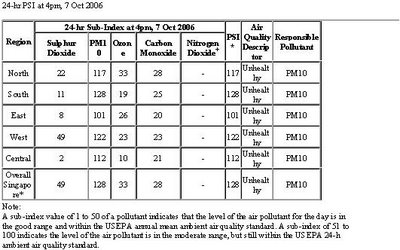What to do about the haze and Indonesia?
It was that bad yesterday. I had to shut every window in the house and not go out at all the whole day. You could see the hazy smog in front of your face. And boy, could you smell it too. Like standing next to a BBQ,.... without the food... the coals and the barby.
The PSI yesterday stood at a 9-year high of 150. Anything over 100 is unhealthy. Although the NEA says it's only hazardous past 200, it looked pretty hazardous to me yesterday.

Today, the PSI has improved tremendously. From around 140 when I went to bed, it was below 30 when I went out for my traditional pre-F1 race brunch. No doubt due to the changing wind direction rather than any concerted effort by the Indonesian authorities.
So now, with my stomach full and my temper cooled by the clear sky and fresh air, I will pen a few observations about how Indonesia's neighbours ie. Malaysia and Singapore, can help Indonesia deal with this problem.
The haze is caused by the smoke from raging forest fires in Indonesia. The fires are started and used to clear land for agriculture. Question is, who wants to clear land?
Apparently,
(1) smallholders, and
(2) plantations.
Smallholders. Why do smallholders use fire to clear land? Simply because it is the cheapest way. The only investment is a box of matches. And smallholders are generally impoverished and can't afford much more than that. Threatening them with laws and regulations won't fill their stomachs and send their kids to school.
However, the right question to ask is why do smallholders need to clear land every year? It's because they plant only once a year, and during the non-planting season, the land lies fallow (idle) and is soon overrun by weeds, woody shrubs and returning forests.
Isn't the solution obvious? Plant more than once a year. Keep the land working the whole year and the annual land clearing exercise won't be necessary.
How? Do what Malaysia and Thailand has done. Turn agriculture from a subsistence industry to an income generating one.
Food crops must be improved to generate multiple harvests a year. Plant good paddy breeds which grow and ripen fast. Paddy fields in Malaysia and Thailand are worked all year and produce at least 2 harvests annually. Japonica rice fields in Taiwan and Japan produce up to 3 harvests a year. 4 harvests are not unheard of.
There are quick maturing food crops like maize (jagung), sweet potatoes, tapioca etc.
Cash crops are also an alternative. Most yield multiple harvests a year eg. vegetables and fruits, and the rest is generally perennial eg. coco, coffee, tea etc.
The main thing about year round agriculture is the fertility of the land. Land which is planted all year round loses it's fertility (nutrients and minerals) quickly. It needs to be left fallow for a period in order to regenerate.
So how do you avoid this need to leave the land idle?
(1) Crop rotation. Different crops need different nutrients and minerals from the soil. It's fairly simple to plan the rotation of a certain series of crops on a regular cycle to allow nutrients depleted by Crop A to be regenerate by the time Crop B and Crop C have been harvested. And certain plants also deposit specific nutrients and minerals into the soil as they grow or when their stalks or roots are left to decompose after harvest. With the right combination and timing of crops, the soil can actually be made more fertile for the next Crop B - by having previously planted Crop A - compared to leaving it fallow for a season.
(2) Active fertilisation and chemical conditioning of the soil. This supplements the nutrients and minerals in the soil so that fertility is continuous.
How can Malaysia and Singapore help? Malaysia has vast experience with research into many crops that yield multiple harvests annually and Singapore has a thriving chemical industry. They can certainly help Indonesia smallholders move away from subsistence farming to high yield food or cash cropping. In addition, Indonesia benefits from not only improved agricultural methods but also an opportunity to reduce poverty amongst it's rural folk.
Plantations. Why do plantations burn to clear land? Same as the smallholders... to save money. The difference however is that plantations are corporates which have the money to clear land responsibly (ecologically and environmentally) but they don't because of there's more profit to burn.
The solution is equally obvious. Hit them where it hurts. Open burning and clearing land using forest fires is illegal in Indonesia. Apply the law and apply it without fear or favour.
I have seen the agricultural bureaucracy in Indonesia and have first hand knowledge of the hoops agricultural companies have to jump through before they are allowed to operate in Indonesia. As such, I have no doubt that if the Indonesian authorities wanted to, they can easily take any companies guilty of illegal burning to task and penalise them heavily.
So, why don't they? Why does the Indonesian government throw its hands up and say there's nothing more they can do? Why, when they know exactly which companies are responsible for which plantations and have satellite photos to show exactly which plantations are being burnt?
I don't want to speculate on the workings of the Indonesia government, but let's just say that Indonesia is not ranked 140th (out of 159 countries) on Transparency International's 2005 Corruption Perception Index for no reason.
No smoke without fire, yes? (No pun intended).
So what can Malaysia and Singapore do?
Actually, nothing much on a govt to govt level, besides more useless diplomacy. What are you going to do? Send your police to Indonesia or use our navies to enforce an embargo on the country? We can try to pressure Indonesia within ASEAN and Non-Aligned Nations organisations just like how we pressured Myanmar. Note however that Indonesia is hardly the 90 pound economic weakling that Myanmar was. They also outnumber Malaysians and Singaporeans combined, by 4 to 1. And they are close enough for their soldiers to swim over. These soldiers did so... once, 40+ years ago and their citizens are still doing it now.
But not all is lost. There are several measures we can use against the plantation companies themselves, without directly offending the Indonesian govt:
- Use trade sanctions to penalise the companies responsible for the burning. Stop imports from or implement levies on these companies. Stop them from using our ports to move their product internationally. Stop any ships carrying their products from using Malaysian & Singaporean waters and ports. Detain and delay these ships if possible. Blacklist these companies and ban the sale of machinery or chemicals etc to them.
- Freeze their funds in Singapore and Malaysian banks. Also freeze the funds of companies held by or associated to, these plantation companies (I suspect this might be very effective). Freeze their investments in property and stock exchanges in our countries as well.
- Close the offices of these companies in Singapore and Malaysia. Stop the movement of employees of these companies into or out of Singapore and Malaysia.



2 comments:
Did know you really gather all the statistics!!! I salute u!!!!!
Salute received and appreciated.
Post a Comment